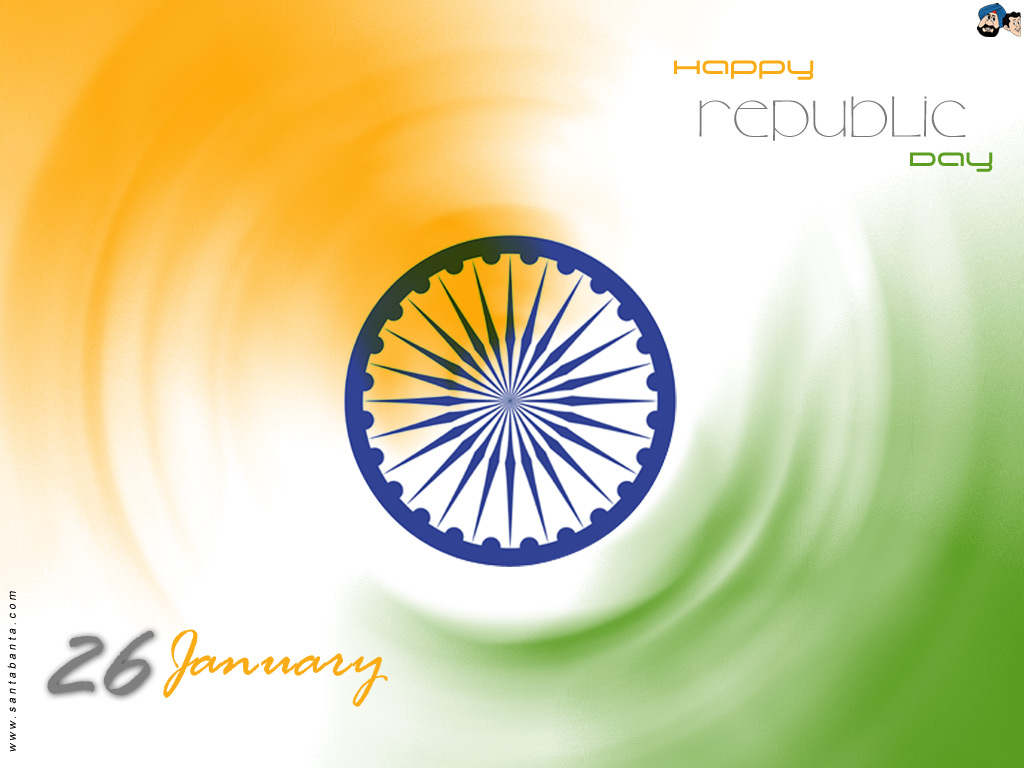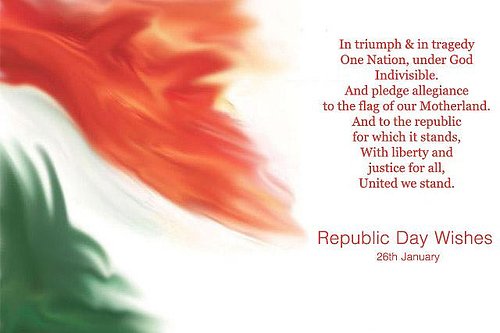
Republic Day is one of the three national holidays of India and the greatest festival celebrated in the country. It is celebrated every year on January 26, in New Delhi with great pomp, fanfare and pageant. While in the capitals of the States and other headquarters, it is marked with patriotic fervor. The most spectacular celebrations are marked by the Republic Day Parade that takes place in the capital of New Delhi at Rajpath. It includes march past of the three armed forces, massive parades, folk dances by tribal folk from different states in picturesque costumes marking the cultural unity of India. Further, the streak of jet planes of Indian Air Force, leaving a trial of colored smoke, marks the end of the festival.

It was the Lahore Session of the Indian National Congress at midnight of December 31, 1929 - January 1, 1930, that the Tri-Color Flag was unfurled by the nationalists and a pledge was taken that on January 26 every year, "Republic Day" would be celebrated and that the people would unceasingly strive for the establishment of a Sovereign Democratic Republic India. The professed pledge was successfully redeemed on January 26, 1950, when the Constitution of India framed by the Constituent Assembly of India came into force, although the Independence from the British rule was already achieved on August 15, 1947. It is because of this fact that August 15 is celebrated as Independence Day, while January 26 as Republic Day.

The Republic Day celebrations of India have rightly become world famous as one of the greatest shows on earth drawing thousands of eager sight-seers from all over the country and many parts of the world as well. No other country can draw on such a wealth of tribal traditions and cultures, with so many regional forms of dances and dress. And, no other country in the world can parade so many ethnically different people in splendid uniforms, all united in their proven loyalty to the Government elected by the people and in their proud traditions and legendary gallantry.

It was the Lahore Session of the Indian National Congress at midnight of December 31, 1929 - January 1, 1930, that the Tri-Color Flag was unfurled by the nationalists and a pledge was taken that on January 26 every year, "Republic Day" would be celebrated and that the people would unceasingly strive for the establishment of a Sovereign Democratic Republic India. The professed pledge was successfully redeemed on January 26, 1950, when the Constitution of India framed by the Constituent Assembly of India came into force, although the Independence from the British rule was already achieved on August 15, 1947. It is because of this fact that August 15 is celebrated as Independence Day, while January 26 as Republic Day.

The Republic Day celebrations of India have rightly become world famous as one of the greatest shows on earth drawing thousands of eager sight-seers from all over the country and many parts of the world as well. No other country can draw on such a wealth of tribal traditions and cultures, with so many regional forms of dances and dress. And, no other country in the world can parade so many ethnically different people in splendid uniforms, all united in their proven loyalty to the Government elected by the people and in their proud traditions and legendary gallantry.

Republic Day in other countries
- Albania: January 11 (1946)
- Armenia: May 28 (1918, see Democratic Republic of Armenia)
- Azerbaijan: May 28 (1918, see Azerbaijan Democratic Republic)
- Burkina Faso: December 11 (1958, Upper Volta became an autonomous republic in the French Community.)
- East Germany: October 7
- Gambia: April 24 (1970)
- Greece: July 24 (1974)
- Ghana: July 1 (1960)
- Guyana: February 23 (1970, also known as Mashramani)
- Iceland: June 17 (1944)
- India: January 26 (1950)
- Iran: April 1 Islamic Republic Day
- Iraq: July 14
- Kenya: around December 12 (1963, see Jamhuri Day.)
- Lithuania: May 15 (1920, known as the Constituent Assembly Day)
- Maldives: November 11 (1968)
- Nepal: May 28 (2008)
- Niger: December 18 (1958)
- North Korea: September 9 (1948)
- Pakistan: March 23 (1956)
- Sierra Leone: April 27, (1961)
- Sri Lanka: May 22, (1972)
- Tunisia: July 25, (1957)
- Turkey: October 29 (1923)
- Trinidad and Tobago:September 24 (1976)


No comments:
Post a Comment